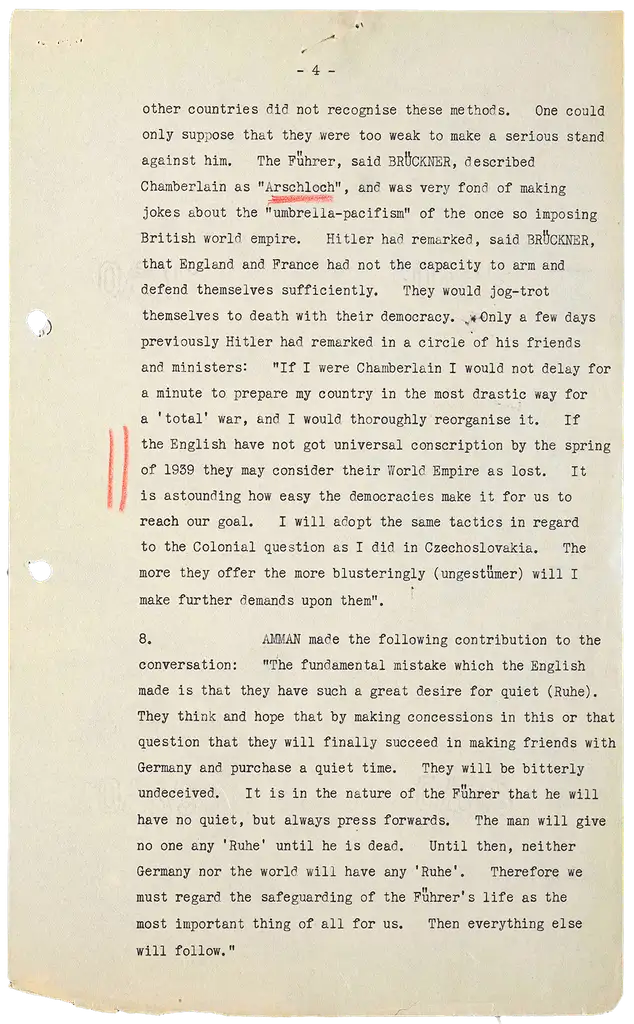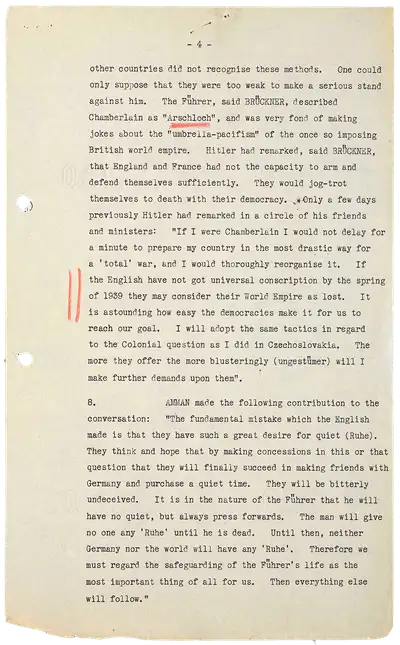Record revealed
A warning from MI5 about the Nazis
This MI5 assessment highlights some of German leader Adolf Hitler’s feelings towards the United Kingdom in 1938 – including (allegedly) describing Prime Minister Neville Chamberlain with a swear word.
Images
Image 1 of 1

Partial transcript
[...] other countries did not recognise these methods. One could only suppose that they were too weak to make a serious stand against him. The Führer, said BRÜCKNER, described Chamberlain as "Arschloch", and was very fond of making jokes about the "umbrella-pacifism" of the once so imposing British world empire. Hitler had remarked, said BRÜCKNER, that England and France had not the capacity to arm and defend themselves sufficiently. They would jog-trot themselves to death with their democracy. Only a few days previously Hitler had remarked in a circle of his friends and ministers: "If I were Chamberlain I would not delay for a minute to prepare my country in the most drastic way for a 'total' war, and I would thoroughly reorganise it. If the English have not got universal conscription by the spring of 1939 they may consider their World Empire as lost. It is astounding how easy the democracies make it for us to reach our goal. I will adopt the same tactics in regard to the Colonial question as I did in Czechoslovakia. The more they offer the more blusteringly (ungestümer) will I make further demands upon them".
Why this record matters
- Date
- 7 November 1938
- Catalogue reference
- KV 4/16
On 30 September 1938, Britain, Italy, Germany and France signed the Munich Agreement, permitting Germany to take control of the Sudetenland region of Czechoslovakia. Prime Minister Chamberlain also signed an Anglo-German agreement of co-operation with Hitler, and famously declared ‘peace for our time’.
This report was compiled in the wake of these developments. It became one of several MI5 assessments that openly criticised government foreign policy towards Nazi Germany in late 1938. It drew on intelligence from German sources to detail Hitler’s increasingly expansionist aims across Europe.
The report states that in MI5’s view, British policy during the Munich Crisis – allowing Germany to annex the parts of Czechoslovakia with a German-speaking majority, and giving other parts of Czechoslovakia a vote on their future – had convinced Hitler that Britain was weak.
It is likely that the report’s aim was to demonstrate to British politicians, especially Neville Chamberlain, that appeasement had encouraged the German leader’s aggression rather than placated it. Outlined are informants' claims that Hitler had referred to Chamberlain as an ‘arsehole’ (‘Arschloch’), and that he had declared that Britain would ‘jog-trot themselves to death with their democracy’. Hitler is also said to have remarked to friends that should Chamberlain delay British military rearmament any further, Britain might consider its empire as lost. He also (reportedly) reflected that ‘it is astounding how easy the democracies make it for us to reach our goal’.
It is not clear as to whether Hitler said all that was attributed to him – it may have been an attempt by disgruntled German sources to provoke a stronger response from Britain. It is thought that Lord Halifax, the Foreign Secretary, who had underlined Hitler’s description of Chamberlain, showed the report to the Prime Minister. The (reported) insult made quite an impression on him, and he would not have appreciated the joke about ‘umbrella-pacifism’, a mocking reference to Chamberlain’s trademark umbrella.
When Hitler broke the Munich Agreement by annexing further areas in Czechoslovakia, British policy towards Germany shifted. Though initially still cautious, Chamberlain initiated a scheme of military rearmament. By the spring of 1939, Britain and France had approved a guarantee to come to the aid of Poland should it be threatened by military action. On 1 September of that year, Germany invaded Poland, Chamberlain issued Britain’s ultimatum – which was ignored – and war was declared on 3 September 1939. The Second World War had begun.
